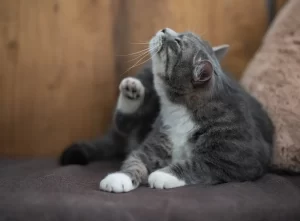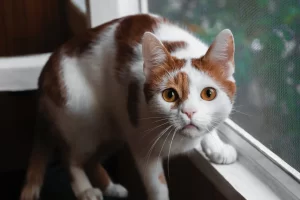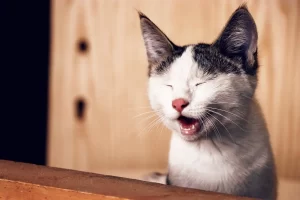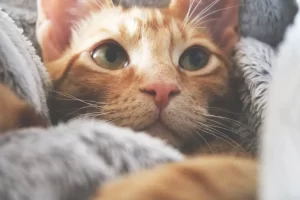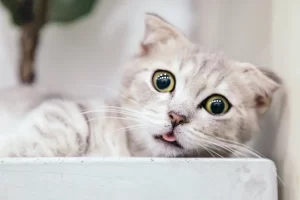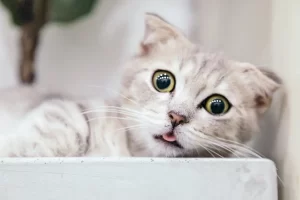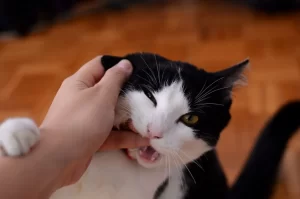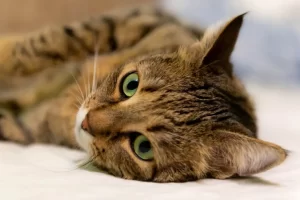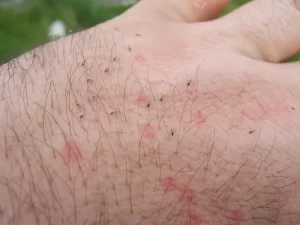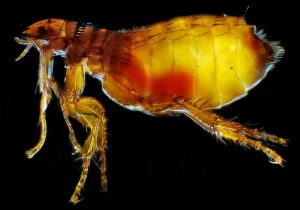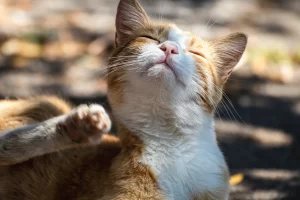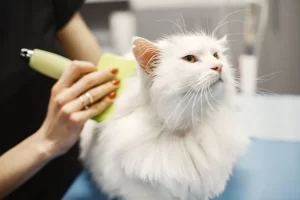Home remedies for cat seizures can provide a natural and holistic approach to managing this often unsettling and frightening condition in cats. While traditional veterinary care, such as medication and surgery, is often necessary to manage seizures, there are also a variety of natural options available that can help alleviate symptoms and support overall health. From dietary changes and herbs to essential oils and acupuncture, home remedies for cat seizures offer a range of options for managing seizures and improving the quality of life for affected cats. It is important to consult with a veterinarian before starting any new home remedy treatment, especially if your cat is already taking medications or has a history of other health conditions.
Table of Contents
ToggleIntroduction to cat seizures
A cat seizure is a sudden, temporary disturbance in the normal functioning of the brain, which can cause changes in behavior, movement, and consciousness. Seizures can be caused by a variety of factors, including brain injury, brain disease, or inherited conditions. They can range from mild to severe and can occur once or repeatedly. It is important to seek veterinary care for a cat experiencing seizures, as they can be indicative of underlying health problems.
Is the cat seizures treatable or the damage is permanent?
Seizures in cats can be treatable, but the extent of treatment depends on the underlying cause. Some seizures can be managed with medication or changes in diet, while others may require more intensive treatment or even surgery. In some cases, the damage caused by seizures may be permanent, especially if the seizures are frequent and left untreated. However, early intervention and proper treatment can help reduce the frequency and severity of seizures and improve the overall health and quality of life of a cat with seizures.
Causes of cat seizures
The main causes of cat seizures are:
- Epilepsy: Inherited or acquired condition that causes recurrent seizures.
- Toxins: Exposure to certain chemicals or drugs can trigger seizures.
- Brain tumors: Tumors in the brain can cause seizures.
- Head trauma: Injuries to the head can lead to brain damage and seizures.
- Infections: Certain infections such as feline infectious peritonitis (FIP) or feline immunodeficiency virus (FIV) can cause seizures.
- Liver disease: Liver disease or failure can lead to low blood sugar levels and seizures.
- Kidney disease: Kidney failure can cause electrolyte imbalances that trigger seizures.
- Hypoglycemia: Low blood sugar levels can cause seizures in cats.
- Electrolyte imbalances: Abnormal levels of sodium, potassium, or calcium can trigger seizures.
- Anemia: Low levels of red blood cells can cause a lack of oxygen to the brain and trigger seizures.
- Idiopathic epilepsy: The cause of seizures is unknown in some cases.
- Stroke: A blood clot or other vascular tissue in the brain can cause a stroke and seizures.
- Metabolic disorders: Certain metabolic disorders, such as hypothyroidism, can lead to seizures.
- Neurological disorders: Conditions such as feline cerebellar hypoplasia (FCH) can cause seizures.
- Seizure triggers: Some cats may have seizures triggered by certain stimuli, such as flashing lights or loud noises.
It is important to note that seizures in cats can have multiple causes, and a combination of factors may be contributing to seizures in a particular cat. A veterinarian can perform tests to help determine the underlying cause of a cat’s seizures.
Signs and symptoms of cat seizures
The most common signs and symptoms of cat seizures are:
- Uncontrolled muscle movements: Twitching, jerking, paddling or rigidity of the limbs, or convulsions.
- Loss of consciousness: The cat may become unconscious or unresponsive during a seizure.
- Loss of bladder control: Incontinence may occur during a seizure.
- Changes in behavior: The cat may become confused, disoriented, or aggressive after a seizure.
- Change in pupil size: Pupils may dilate or constrict during a seizure.
- Loss of coordination: The cat may stumble, fall, or have trouble walking.
- Salivation: Excessive drooling or foaming at the mouth may occur during a seizure (See cat drooling home remedies).
- Repetitive behavior: The cat may repeatedly run into walls or objects, or chase its tail.
- Yowling or vocalizing: The cat may make unusual vocalizations during a seizure.
- Breathing changes: The cat may take shallow breaths or stop breathing temporarily during a seizure.
- Flicking or blinking of eyes: Rapid eye movements or blinking may occur during a seizure.
- Post-ictal phase: After a seizure, the cat may experience symptoms such as fatigue, confusion, or temporary blindness.
It is important to note that the signs and symptoms of a cat seizure can vary depending on the underlying cause and the severity of the seizure. A veterinarian can perform tests to help determine the cause and severity of a cat’s seizures and recommend the appropriate treatment.
Importance of veterinary care in treating cat seizures
- Diagnosis: A veterinarian can perform tests to determine the underlying cause of a cat’s seizures and develop an appropriate treatment plan.
- Treatment: A veterinarian can prescribe medications or other treatments to help manage seizures and improve a cat’s quality of life.
- Monitoring: A veterinarian can monitor the frequency and severity of seizures and adjust treatment as needed.
- Prevention: Early intervention and proper treatment can help prevent future seizures and reduce the risk of permanent damage to the brain.
- Identification of underlying conditions: Seizures can be a symptom of an underlying health problem, such as a brain tumor or liver disease (read more about liver disease and associate treatments here). A veterinarian can perform tests to identify these conditions and recommend the appropriate treatment.
- Safety: Seizures can be dangerous for a cat and can result in injury, especially if the cat is unattended during a seizure. A veterinarian can advise on the best way to protect a cat during a seizure and minimize the risk of injury.
Regular veterinary care is important for cats with seizures, as it can help prevent and manage the condition and improve the overall health and well-being of the cat.
Read more on How often should I take my cat to the vet?
Home remedies for cat seizures
- Herbs: Some herbs, such as valerian root, passionflower, and chamomile, may help calm the nervous system and reduce the frequency of seizures. Consult with a veterinarian before using herbs as a home remedy, as some can interact with medications or have side effects.
- Diet: A high-quality, balanced diet that is low in simple carbohydrates and high in healthy fats can help regulate blood sugar levels and reduce the risk of seizures.
- Supplements: Supplements, such as omega-3 fatty acids, antioxidants, and magnesium, may help support brain health and reduce the frequency of seizures. Consult with a veterinarian before using supplements as a home remedy, as some can interact with medications or have side effects.
- Stress management: Reducing stress in a cat’s environment can help reduce the risk of seizures. Provide a quiet, calm environment, and consider using techniques such as pheromone therapy or soft music to help reduce stress.
- Exercise: Regular exercise can help improve a cat’s overall health and reduce the risk of seizures.
Below we will dig deeper into each of these categories. Note that home remedies should not be used as a substitute for veterinary care, and that a veterinarian should be consulted before using any home remedies for cat seizures

The role of diet in preventing seizures
Diet plays an important role in maintaining the overall health and well-being of a cat and can help prevent seizures by regulating blood sugar levels and supporting brain health. Some recommended diets for preventing seizures in cats include:
- High-protein, low-carbohydrate diets: A diet that is high in protein and low in carbohydrates can help regulate blood sugar levels and reduce the risk of seizures.
- Diets high in healthy fats: Omega-3 fatty acids, found in fish oil and certain plant oils, can help support brain health and reduce the risk of seizures.
- Homemade diets: Homemade diets made with fresh, whole ingredients can help control the quality and quantity of ingredients that a cat is exposed to, and can be tailored to meet the specific needs of the cat.
- Prescription diets: Prescription diets formulated for cats with seizures are available and may contain specific ingredients to help manage the condition.
It is important to consult with a veterinarian before making any changes to a cat’s diet, as dietary changes can have significant effects on a cat’s health. A veterinarian can recommend a balanced diet that is appropriate for a cat’s age, weight, and overall health, and can help monitor the effects of dietary changes on a cat’s seizures.
Herbal remedies for cat seizures
- Valerian root: Valerian root is an herb that is commonly used to calm the nervous system and reduce anxiety. It may also help reduce the frequency of seizures in some cats. Valerian root can be given as a supplement or as a tea.
- Passionflower: Passionflower is an herb that is commonly used to reduce anxiety and calm the nervous system. It may also help reduce the frequency of seizures in some cats. Passionflower can be given as a supplement or as a tea.
- Chamomile: Chamomile is an herb that is commonly used to calm the nervous system and reduce anxiety. It may also help reduce the frequency of seizures in some cats. Chamomile can be given as a supplement or as a tea.
- Skullcap: Skullcap is an herb that is commonly used to calm the nervous system and reduce anxiety. It may also help reduce the frequency of seizures in some cats. Skullcap can be given as a supplement or as a tea.
Note that herbs should not be used as a substitute for veterinary care and that a veterinarian should be consulted before using any herbs as a home remedy for cat seizures.
Essential oils for cat seizures
The most popular essential oils used for cat seizures are:
- Coconut oil: Coconut oil is a natural oil that is high in medium-chain fatty acids (MCFAs) and is commonly used as a supplement for its various health benefits, including its potential benefits for seizures. Coconut oil may help improve brain function and reduce inflammation in the brain, which may help reduce the frequency and severity of seizures in cats. Coconut oil can be added to the cat’s food or applied topically.
- Hemp oil: Hemp oil is derived from the seeds of the hemp plant and is high in omega-3 and omega-6 fatty acids, as well as other nutrients and compounds that may have beneficial effects on brain function. Hemp oil may help reduce inflammation in the brain and improve brain function, which may help reduce the frequency and severity of seizures in cats. Hemp oil can be added to the cat’s food or applied topically. The recommended dose will depend on the cat’s size and overall health, and should be determined by a veterinarian.
- CBD oil: CBD oil is derived from the hemp plant and is rich in cannabidiol (CBD), a compound that has been shown to have anti-inflammatory and neuroprotective effects. CBD oil may help reduce inflammation in the brain and improve brain function, which may help reduce the frequency and severity of seizures in cats. CBD oil should only be used under the direction and supervision of a veterinarian. The correct dose will depend on the cat’s age, weight, and overall health, and should be determined by a veterinarian.
- Lavender oil: Lavender oil is commonly used for its calming and relaxing properties and may help reduce the frequency of seizures in some cats. Dilute the lavender oil with a carrier oil such as coconut oil before applying it to the cat’s skin. Do not allow the cat to ingest the lavender oil.
- Roman chamomile oil: Roman chamomile oil is commonly used for its calming and relaxing properties and may help reduce the frequency of seizures in some cats. Dilute the Roman chamomile oil with a carrier oil such as coconut oil before applying it to the cat’s skin. Do not allow the cat to ingest the Roman chamomile oil.
- Cedarwood oil: Cedarwood oil is commonly used for its calming and relaxing properties and may help reduce the frequency of seizures in some cats. Dilute the cedarwood oil with a carrier oil such as coconut oil before applying it to the cat’s skin. Do not allow the cat to ingest the cedarwood oil.
It is important to note that essential oils should not be used as a substitute for veterinary care, and that a veterinarian should be consulted before using any essential oils as a home remedy for cat seizures.
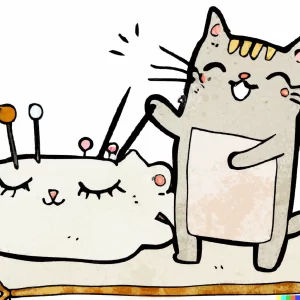
Acupuncture for cat seizures
Acupuncture is a traditional Chinese medicine technique that involves the insertion of thin needles into specific points on the body to stimulate energy flow and promote healing. It may be used as a complementary therapy to help manage seizures in cats. Acupuncture may help reduce the frequency and severity of seizures, as well as provide a calming effect and reduce stress and anxiety in cats.
Benefits of massage for cat seizures
Massage therapy is the manipulation of the soft tissues of the body, such as the muscles, connective tissue, and skin, to promote relaxation and alleviate pain and discomfort. It may be used as a complementary therapy to help manage seizures in cats.
Massage therapy may help reduce stress and anxiety in cats (see other remedies useful for stress), which can in turn help reduce the frequency and severity of seizures. Massage can also help improve circulation and reduce muscle tension, which can help the cat feel more relaxed and comfortable.
Consult with a veterinarian before starting massage therapy on a cat. Massage should be performed gently and slowly, and the cat should be relaxed and comfortable throughout the massage. It is important to be patient and to allow the cat to dictate the pace and pressure of the massage, as some cats may be more sensitive than others. Massage should not be performed directly on areas of the body that are affected by seizures.
Medications and over-the-counter medicines
- Prescription medications: Anticonvulsant medications are the most commonly used drugs to treat seizures in cats. These drugs work by controlling the electrical activity in the brain, reducing the frequency and severity of seizures. Some commonly used anticonvulsant medications for cats include phenobarbital, diazepam, and potassium bromide.
- Over-the-counter medications: There are no over-the-counter medications specifically approved for the treatment of seizures in cats. It is important to consult with a veterinarian before giving any over-the-counter medications to a cat, as some medications can be harmful to cats and interfere with other medications that the cat may be taking.
It is important to note that seizure management requires a veterinary diagnosis and close monitoring and that anticonvulsant medications should only be used under the direction and supervision of a veterinarian.
Melatonin for cat seizures
Melatonin is a hormone that helps regulate the sleep-wake cycle and is naturally produced by the body. It is sometimes used as a complementary therapy for seizures in cats.
Melatonin has a calming effect and may help reduce stress and anxiety in cats, which can in turn help reduce the frequency and severity of seizures. Melatonin may also help improve sleep, which can be disrupted by seizures.
Melatonin should only be used under the direction and supervision of a veterinarian. The correct dose of melatonin for a cat will depend on the cat’s age, weight, and overall health. It is important to follow the dosage instructions provided by the veterinarian and to monitor the cat’s response to the medication. Overuse of melatonin can have adverse effects, including drowsiness, confusion, and an increased risk of seizures.
Remember that melatonin is not a cure for seizures and that it should only be used as part of a comprehensive treatment plan that includes proper veterinary care and management of any underlying health conditions that may be contributing to the seizures.
Supplements for cat seizures
The main supplements for cat seizures are:
- Omega-3 fatty acids: Omega-3 fatty acids, such as EPA and DHA, are essential fatty acids that have anti-inflammatory properties and are important for brain and nervous system function. Supplementation with omega-3 fatty acids may help reduce inflammation in the brain and improve brain function, which may help reduce the frequency and severity of seizures in cats.
- Vitamin B6 (pyridoxine): Vitamin B6 plays an important role in the production of neurotransmitters, which are chemicals that transmit signals between nerve cells in the brain. Supplementation with vitamin B6 may help improve brain function and reduce the frequency and severity of seizures in cats.
- Vitamin E: Vitamin E is a powerful antioxidant that may help protect the brain from oxidative stress, which can damage brain cells and contribute to seizures. Supplementation with vitamin E may help reduce the frequency and severity of seizures in cats.
- Magnesium: Magnesium is an important mineral that plays a role in regulating electrical activity in the brain. Low levels of magnesium have been associated with an increased risk of seizures. Supplementation with magnesium may help regulate electrical activity in the brain and reduce the frequency and severity of seizures in cats.
- Taurine: Taurine is an amino acid that is important for heart and brain function. Supplementation with taurine may help improve brain function and reduce the frequency and severity of seizures in cats.
Minerals are also playing an important role in cats’ well-being. The main Minerals for cat seizures are:
- Magnesium: Magnesium is an important mineral that plays a role in regulating electrical activity in the brain. Low levels of magnesium have been associated with an increased risk of seizures. Supplementation with magnesium may help regulate electrical activity in the brain and reduce the frequency and severity of seizures in cats.
- Calcium: Calcium is an important mineral that is involved in the regulation of electrical activity in the brain and nervous system. Supplementation with calcium may help regulate electrical activity in the brain and reduce the frequency and severity of seizures in cats.
Supplements and minerals should only be used under the direction and supervision of a veterinarian. The correct dose will depend on the cat’s age, weight, and overall health. It is important to follow the dosage instructions provided by the veterinarian and to monitor the cat’s response to the supplementation. Overuse of supplements and minerals can have adverse effects, including an increased risk of seizures.
importance of Stress management
Stress management is important in the management of cat seizures because stress can be a trigger for seizures in some cats. Chronic stress can also weaken the immune system, increase inflammation in the body, and disrupt the normal functioning of the nervous system, which can increase the likelihood and severity of seizures.
Therefore, it is important to take steps to reduce stress and manage the stressors in a cat’s environment, such as providing a quiet, safe, and consistent living environment, and engaging in activities that promote relaxation and comfort, such as gentle petting, playing, and spending time in quiet, comfortable environments.
Why doing exercises can be beneficial for cat seizures?
Exercise can be beneficial for cat seizures as it can help reduce stress, improve overall health and well-being, and support healthy brain function. Regular exercise can also help prevent obesity, which can increase the risk of seizures and other health problems.
Good exercises for cats include:
- Playtime with interactive toys such as feather wands or laser pointers
- Outdoor walks or indoor play areas with climbing structures and hiding places
- Training sessions to build basic obedience skills and mental stimulation
- Fetch or chase games with small toys
- Agility training with specialized equipment.
Which vet to visit with what expertise?
If your cat is experiencing seizures, it is important to see a veterinarian who specializes in the treatment of neurological conditions in animals. A veterinary neurologist is a veterinarian who has completed additional training in the diagnosis and treatment of neurological conditions, including seizures.
If a veterinary neurologist is not available in your area, a general practitioner veterinarian with experience in treating seizures can also be consulted. They may refer you to a veterinary neurologist or other specialists if necessary.
It is important to work closely with your veterinarian to determine the cause of your cat’s seizures, develop a treatment plan, and monitor their progress. Regular check-ups, blood tests, and imaging studies, such as CT scans or MRI, may be necessary to track the progression of the disease and adjust the treatment plan accordingly.
Read more on How often do you take a cat to the vet?


